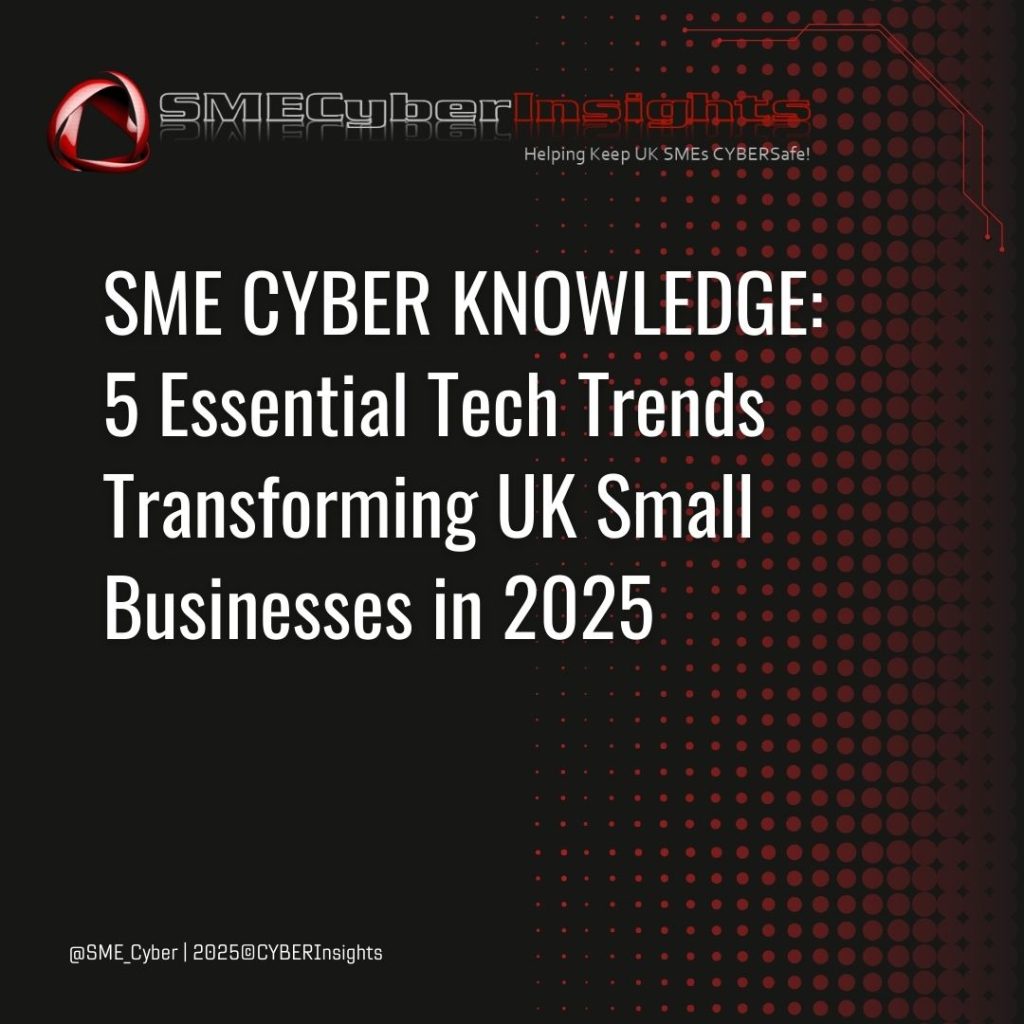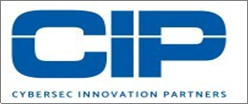SME CYBER KNOWLEDGE: 5 Essential Tech Trends Transforming UK Small Businesses in 2025
May 19, 2025
Helping Keep Small Business CYBERSafe!
Gibraltar: Monday 19 May 2025 at 10:00 CET
SME CYBER KNOWLEDGE: 5 Essential Tech Trends Transforming UK Small Businesses in 2025
Compiled By: JJ Price – Director of Media
SMECYBERInsights – The UK Small Business Cybersecurity Network
Google Indexed on 190525 at 11:39 CET
#SMECyberInsights #SMECyberSecurity #SMECyberAwareness #CyberSafe #SME #SmallBusiness #CyberKnowledge
In today’s rapidly evolving business landscape, staying ahead of technological advancements isn’t just advantageous—it’s essential for survival and growth. For UK small and medium enterprises (SMEs) navigating 2025, certain tech trends offer particularly significant opportunities for operational improvement, market expansion, and competitive advantage. Here are the five most crucial tech trends UK SMEs should be monitoring and implementing this year:
1. Practical AI Integration for Business Process Optimisation
While generative AI made headlines in previous years, 2025 marks the era of practical AI implementation for SMEs. UK businesses are increasingly adopting specialised AI tools designed specifically for their industry and size.
Key developments:
• Sector-specific AI solutions for retail, professional services, and manufacturing that require minimal technical expertise
• AI-powered financial management systems that combine accounting, cash flow forecasting, and regulatory compliance
• Customer service automation that seamlessly integrates with UK-specific business practices and regulations
• Growing availability of AI consultancies specifically serving the SME market with affordable, tailored solutions
Implementation tip: Start with a single, high-impact business process rather than attempting comprehensive AI transformation. Many UK SMEs are finding success by first applying AI to customer data analysis or inventory management.
2. Enhanced Cybersecurity Solutions for Regulatory Compliance
With the UK’s post-Brexit regulatory environment continuing to evolve, SMEs face increasing pressure to maintain robust cybersecurity measures while navigating complex compliance requirements.
Key developments:
• Managed security service providers (MSSPs) offering affordable, comprehensive packages tailored to UK regulatory frameworks
• Automated compliance tools that continuously monitor adherence to UK data protection laws and industry-specific regulations
• Integration of cybersecurity measures with business continuity planning, particularly important as remote/hybrid work remains standard
• Rising adoption of security frameworks specifically designed for resource-constrained organisations
Implementation tip: Consider cybersecurity as a business enabler rather than just a cost centre. UK SMEs with demonstrable security credentials are increasingly winning contracts from larger organisations and public sector bodies.
3. Edge Computing and IoT for Operational Efficiency
The convergence of edge computing and Internet of Things (IoT) technologies is creating new opportunities for UK SMEs to optimise operations, particularly in sectors like manufacturing, logistics, and retail.
Key developments:
• Affordable IoT sensor networks that provide real-time data on everything from energy usage to foot traffic
• Edge computing solutions that process data locally, reducing latency and cloud computing costs
• Emergence of IoT-as-a-Service models making sophisticated monitoring accessible to smaller businesses
• Cross-integration with AI for predictive maintenance and inventory management
Implementation tip: Start with clear business objectives rather than adopting technology for its own sake. Many successful UK SME implementations begin with energy efficiency monitoring, which delivers measurable ROI through reduced utility costs.
4. Digital Supply Chain Resilience
Following years of global supply chain disruptions and post-Brexit adjustments, UK SMEs are increasingly implementing digital tools to enhance supply chain visibility and resilience.
Key developments:
• Supply chain management platforms specifically designed for SMEs, with enhanced visibility across UK and international suppliers
• Blockchain-based provenance tracking becoming accessible to smaller businesses, particularly in food, textiles, and manufacturing
• AI-powered demand forecasting tools calibrated for the UK market’s specific patterns and regulations
• Digital twin technology becoming more accessible for manufacturing SMEs
Implementation tip: Begin with comprehensive supply chain mapping to identify vulnerabilities before implementing technological solutions. Even basic digital tracking can significantly improve visibility and resilience.
5. Sustainable Technology Investment
With the UK’s push toward net-zero emissions and increasing consumer demand for sustainable business practices, green technology is becoming a critical investment area for forward-thinking SMEs.
Key developments:
• Energy management systems that optimise usage and reduce costs while supporting sustainability goals
• Growing market for refurbished and energy-efficient IT hardware with compelling ROI calculations
• Carbon footprint monitoring tools specifically calibrated for UK business reporting requirements
• Green tech grants and incentives from UK government bodies making sustainable technology more accessible
Implementation tip: Approach sustainable technology as both an ethical and commercial opportunity. UK consumers and B2B clients increasingly prefer environmentally responsible businesses, creating market advantages for early adopters.

Conclusion
For UK SMEs, 2025 represents a crucial period for technological adoption. Those who strategically implement these key technologies stand to gain significant competitive advantages through improved efficiency, resilience, and market positioning. The key to success lies not in adopting every emerging technology, but in selecting and implementing solutions that address specific business challenges and opportunities within the unique context of the UK business environment.
While the initial investment in these technologies may seem daunting for resource-constrained organisations, the long-term benefits—including operational efficiency, market differentiation, and regulatory compliance—make them essential considerations for any forward-thinking UK SME in 2025.
UK Small Business Owner? Join SMECyber Free Now! & Access the SME Cyber Forum – Read, Learn, Engage, Share …
The Latest SME Cybersecurity News, Threat Intelligence & Analysis, Timely Scam Alerts, Best-practice Compliance, Mitigation & Resources specifically curated for UK Based SMEs in a Single Weekly Email direct to your Inbox or Smart Device together with Unrestricted Free Access to our entire SME Cyber Knowledge & Tutorial Library.
FOXTECH – Effortless Security | World-class Expertise
Managed Cyber Security Services for SMEs – Security monitoring, vulnerability management, penetration testing and consultancy. Get straightforward advice on how to make your business more secure.
Get In Touch – Get in touch for a free, no obligation consultation. If you would prefer to speak to an expert now call us on: 0330 223 5622
LinkedIn: @FoxtechUK | Email: [email protected]
Foxtrot Technologies, England. UK
























